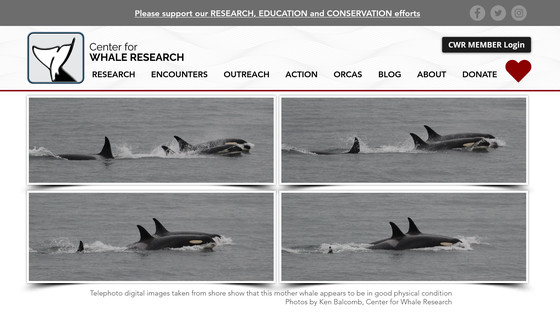Do animals mourn the death of their friends?

Humans feel sad and painful when a close person or important friend dies, but many wild animals and pets show a reaction that mourns the death of a friend. Live Science, a scientific media, summarizes whether these reactions of animals are actions that mourn the death of their fellows.
Do animals grieve? | Live Science

The idea that animals are deeply saddened and depressed by the death of relatives and friends has long been ignored as an unscientific problem, but animal researchers have reported various cases. After the death of an old chimpanzee called Flo deep in the Tanzanian rainforest in 1972, his son Flint was reported to have suddenly become lethargic, had no appetite and became isolated from the herd. Masu. At the time, animal behaviorist Jane Goodall told The Sunday Times, 'Flint, who had a deep affection for his mother, seldom ate after her death, and within three weeks he had lost three pounds. The number of cases decreased to nearly 2. One month after Flo's death, Flint passed away, still emaciated.

In addition, a female chimpanzee observed in Zambia continued to behave like brushing the teeth of a deceased young child with grass. A study published in Scientific Reports in 2017 said, 'This is almost a funeral ritual.'
Similar ``behaviors of mourning the death of a friend'' have been reported in other animals besides chimpanzees. Zoe Muller, a wildlife biologist at the University of Bristol in the UK, discovered that in 2010, a mother giraffe on the savannah stood near a dead calf, and a herd of 17 giraffes cuddled with it for two days, frequently picking up on the fallen calf. I'm reporting on how it looks. Even after the baby giraffe was eaten by a hyena, the mother giraffe did not eat food and just watched over the baby.

In 2018, a female orca made

Elephants often exhibit impressive behavior in response to the death of their comrades. African elephants carry around the jawbones of deceased relatives, and are known to huddle close to corpses and remain silent for long periods of time, with their heads bowed and their trunks on the ground, almost motionless. In addition, Asian elephants have shown behavior in which they collect branches, trees, leaves, etc. to bury their corpses, and elephant researcher Sangeeta Pokharel says, ``The behavior of decorating and walking around a corpse is exactly like a religious culture. 'It reminds me of funerals held in .'
Not only herds of wild animals, but domesticated animals also react to the death of their friends. Stefania Uccedu, an Italian veterinarian and researcher, examined a sick dog that refused to eat and found that there was no problem with his blood or heart. Therefore, Mr. Uccedu concludes, ``The only possible cause is that the dog's brother died a week ago.'' This experience led Uccedu to begin researching the dogs involved in the deaths of their companions. In addition, a study conducted by Federica Pirone of the University of Milan's Faculty of Veterinary Medicine and colleagues conducted a questionnaire survey to find out how dogs bought as pets reacted when they lost their companions. In addition to changes such as the dogs starting to pull back and cries more frequently, many negative reactions were reported, such as the animals playing less frequently, eating less, and sleeping longer.
Research results show that ``domestic dogs behave as if they are actually sad when a friend dies'' - GIGAZINE

Looking at elephants' behavior as if they were mourning the death of a friend, Pokharel said, ``As humans, we can clearly see a certain kind of sadness in elephants' behavior.However, I don't know if we can call it sadness.'' ” he says. Because there is a lack of conclusive scientific evidence about what kind of situations animals experience, ``to simply describe it as ``sadness'' would be like anthropomorphizing animals.'' Mr. Pokerel says the difficulty of research.
An animal's reaction to death may also be due to curiosity, confusion due to loss, stress due to change in environment, fear, etc. rather than sadness. For example, crows have a tendency to gather around deceased crows and treat them violently, attack them, and attempt to mate with them, which some researchers believe is a ``familiarity with the concept of risk and threat for crows.'' ``This experience could be an opportunity for us to learn about our own vulnerabilities.''
Even humans do not have an accurate understanding of what grief feels like. Anthropologist Barbara J. King, author of the book How Animals Grieve, says, ``Human grief involves changes in essential functions, such as eating, sleeping, and socializing.'' Death can be defined by deviations from normal patterns. Death causes deviations from these patterns, which widens the web of grief. This emotion is not limited to humans, but includes dozens of animal species. It will happen,” he claims.
Amazon | How Animals Grieve | King, Barbara J. | Pet Loss

In any case, research on animal cognition and emotion is severely lacking, and ultimately, unless we can communicate with animals, we cannot know definitively. However, Pokharel concludes that knowing that animals act as if they are sad can lead to feelings and activities to protect animals more carefully.
Related Posts:






